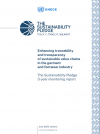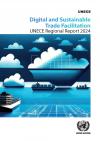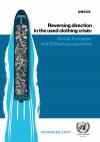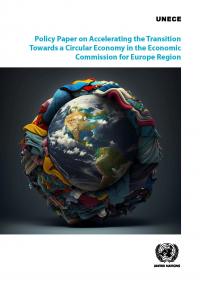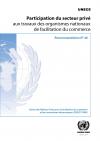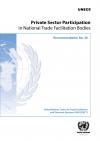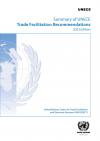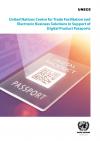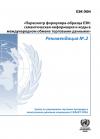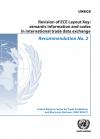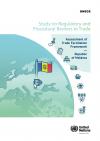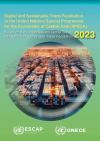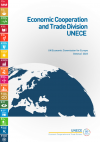Publications
Displaying Results 1 - 20 of 126
- English
“The Sustainability Pledge 3-year monitoring report” presents the results of monitoring activities conducted in the context of the United Nations Economic
Commission for Europe (UNECE)’s Call to Action, the Sustainability Pledge1. The Call to Action was launched in 2021 under the initiative “Enhancing transparency and traceability for more sustainable value chains in the garment and footwear
- English
The fifth United Nations Global Survey on Digital and Sustainable Trade Facilitation, jointly conducted by the five United Nations Regional Commissions and UNCTAD, offers an in-depth and comparative analysis of the implementation of 60 trade facilitation measures in over 160 countries worldwide in 2023. Aside from measures in the WTO TFA, the survey covers the implementation of cutting-edge
- English
The textile industry has evolved from a production model based on natural fibres and protectionist policies for local industry to a model where synthetic fibres have become pervasive, production has been offshored, and the speed of manufacture and distribution of products has increased rapidly. Most of the fashion industry operates under the fast-fashion model, which involves more collections per
- English
This policy paper reviews the state of play of traceability and transparency approaches in three economic sectors critical to the circular transition in the ECE region: the agrifood, garment and footwear, and minerals sectors. Moreover, it provides an overview of the challenges and opportunities for advancing the circular economy and highlights successful practices from the whole region. Lastly,
- Français
L’objet de la présente recommandation est de sensibiliser les pouvoirs publics à la nécessité de faire participer activement le secteur privé aux travaux des organismes nationaux de facilitation du commerce (ONFC) afin de rendre ces derniers plus pertinents, plus légitimes et plus performants. Dans la Recommandation no 4 de la Commission économique pour l’Europe (CEE), initialement approuvée en
- English
The purpose of this recommendation 48 (ECE/TRADE/479) is to communicate to governments how important the active engagement of the private sector is in national trade facilitation bodies (NTFBs) for strengthening their relevance, legitimacy and performance. The United Nations Economic Commission for Europe (ECE) Recommendation No. 4, originally approved in 1975 and revised in 2015, stressed that
- Pусский
Цель данной рекомендации состоит в том, чтобы довести до сведения правительств, насколько важным является активное участие частного сектора в работе национальных органов по упрощению процедур торговли (НОУТ) в целях повышения их значимости, легитимности и эффективности. В Рекомендации Европейской экономической комиссии Организации Объединенных Наций (ЕЭК) № 4, первоначально утвержденной в 1975
- English
This publication (ECE/TRADE/475) provides the following information on each recommendation:
Brief description
Equivalent ISO standard number (where appropriate)
Current status, indicating whether the recommendation is under development, approved or under revision
Dates and publication numbers of documents containing the first approved and last revised versions of the recommendation
Indication and
- English
Digital tools can play an important role in accelerating the shift to a circular economy. Digital tools can increase transparency along value chains and provide information, which in turn can help to extend the lifecycle of products.
Digital Product Passports (DPPs), for example, can inform consumers and businesses about products, materials, the conditions under which they are produced and their
- Pусский
Рекомендация № 2 Европейской экономической комиссии (ЕЭК) Организации Объединенных Наций была первоначально утверждена одновременно с Рекомендацией № 1 ЕЭК «Формуляр-образец Организации Объединенных Наций для внешнеторговых документов», чтобы подчеркнуть важность четкого определения используемой в документах информации и рекомендовать применение перечней кодов, когда это возможно. Позднее она
- Français
La Recommandation no 2 de la Commission économique pour l’Europe (CEE) a été initialement approuvée en même temps que la Recommandation no 1 intitulée « Formule-cadre des Nations Unies pour les documents commerciaux » afin de souligner qu’il importait d’arrêter une définition univoque des informations figurant dans les documents et de recommander l’utilisation de listes de codes dans la mesure du
- English
United Nations Economic Commission for Europe (ECE) Recommendation No. 2 was originally approved at the same time as ECE Recommendation No. 1: United Nations Layout Key for Trade Documents to underline the importance of unambiguous definition of the information in documents and to recommend the use of code lists to the extent possible. It was later integrated into the United Nations Layout Key
- English
This study (ECE/TRADE/477) provides information regarding the current state of play of the trade facilitation framework and the remaining outstanding Category C commitments, including the current standing with respect to the implementation status of specific measures, further capacity needs, and recommendations for the way forward. It also specifies which recommendations refer to mandatory
- English
This report is part of a global survey effort on the implementation of trade facilitation and paperless trade measures, undertaken jointly by the five United Nations Regional Commissions for Africa (ECA), Europe (ECE), Asia and the Pacific (ESCAP), Latin America and the Caribbean (ECLAC) and West Asia (ESCWA) as well as the United Nations Conference on Trade and Development (UNCTAD).
This report
- English
The Economic Cooperation and Trade Division (ECTD) assists UNECE’s 56 member States to better integrate into the world economy and to harness trade, innovation and infrastructure financing and investment for the sustainable development of the UNECE region. ECTD’s normative tools cover many diverse areas, ranging from trade facilitation and agricultural quality standards to ESG traceability of
- Français
À l’heure actuelle, plus d’un tiers de la nourriture produite est perdue ou gaspillée le long des chaînes d’approvisionnement et au niveau des consommateurs, ce qui a des répercussions considérables sur la disponibilité de la nourriture et sur la durabilité environnementale des systèmes alimentaires. Le défi est de taille, surtout pour les fruits et légumes frais, dont le commerce s’effectue
- English
Currently over a third of all food produced is lost or wasted along supply chains and at consumer levels, with considerable impacts on both the availability of food and the environmental sustainability of food systems. The challenge is particularly pronounced for fresh fruit and vegetables, which are frequently traded over large distances, involving several actors. Their perishable nature means
- Pусский
В настоящее время более трети всего производимого продовольствия теряется или превращается в отходы по цепочкам поставок и на уровне потребителей, что оказывает значительное влияние как на доступность продовольствия, так и на экологическую устойчивость продовольственных систем. Особенно остро эта проблема стоит в отношении свежих овощей и фруктов, торговля которыми часто осуществляется на большие
- English
- Pусский
Укрепление потенциала является одним из основных аспектов налаживания и обеспечения производства высококачественного семенного картофеля. Настоящее Руководство предназначено для организации курсов или семинаров по укреплению потенциала в странах, которые еще не создали систему семенного картофеля, но намерены принять к использованию Стандарт на семенной картофель ЕЭК ООН или разработать


